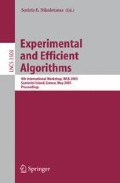Abstract
In this work we experimentally study the min order Radiocoloring problem (RCP) on Chordal, Split and Permutation graphs, which are three basic families of perfect graphs. This problem asks to find an assignment using the minimum number of colors to the vertices of a given graph G, so that each pair of vertices which are at distance at most two apart in G have different colors. RCP is an NP-Complete problem on chordal and split graphs [4]. For each of the three families, there are upper bounds or/and approximation algorithms known for minimum number of colors needed to radiocolor such a graph [4,10].
We design and implement radiocoloring heuristics for graphs of above families, which are based on the greedy heuristic. Also, for each one of the above families, we investigate whether there exists graph instances requiring a number of colors in order to be radiocolored, close to the best known upper bound for the family. Towards this goal, we present a number generators that produce graphs of the above families that require either (i) a large number of colors (compared to the best upper bound), in order to be radiocolored, called “extremal” graphs or (ii) a small number of colors, called “non-extremal”instances. The experimental evaluation showed that random generated graph instances are in the most of the cases “non-extremal” graphs. Also, that greedy like heuristics performs very well in the most of the cases, especially for “non-extremal” graphs.
Access this chapter
Tax calculation will be finalised at checkout
Purchases are for personal use only
Preview
Unable to display preview. Download preview PDF.
References
Agnarsson, G., Greenlaw, R., Halldorsson, M.H.: Powers of chordal graphs and their coloring, Congressus Numerantium (since September 2000)
Andreou, M.I., Papadopoulou, V.G., Spirakis, P.G., Theodorides, B., Xeros, A.: Generating and Radiocoloring Families of Perfect Graphs, CRESCCO Technical Report (2004)
Andreou, M., Nikoletseas, S., Spirakis, P.: Algorithms and Experiments on Colouring squares of Planar Graphs. In: Jansen, K., Margraf, M., Mastrolli, M., Rolim, J.D.P. (eds.) WEA 2003. LNCS, vol. 2647, pp. 15–32. Springer, Heidelberg (2003)
Bodlaendera, H.L., Kloksb, T., Tana,c, R.B., Leeuwena, J.V.: Approximations for λ-Coloring of Graphs. a Utrecht University, The Netherlands, b Vrije Universiteit, The Netherlands, c University of Sciences & Arts of Oklahoma, OK 73018, U.S.A
Fotakis, D.A., Nikoletseas, S.E., Papadopoulou, V.G., Spirakis, P.G.: NP-Completeness Results and Efficient Approximations for Radiocoloring in Planar Graphs. Journal of Theoretical Computer Science (to appear)
Fotakis, D., Spirakis, P.: Assignment of Reusable and Non-Reusable Frequencies. In: International Conference on Combinatorial and Global Optimization (1998)
Golumbic, M.C.: Algorithmic Graph Theory and Perfect Graphs. Academic Press Inc., London (1980)
Hale, W.K.: Frequency Assignment: Theory and Applications. Proceedings of the IEEE 68(12) (December 1980)
Mehlhorn, K., Naher, S.: The LEDA Platform of Combinatorial and Geometric Computing. Cambridge University Press, Cambridge (1999)
Sakai, D.: Labeling Chordal Graphs: Distance Two Condition. SIAM J. Disc. Math. 7, 133–140 (1994)
Author information
Authors and Affiliations
Editor information
Editors and Affiliations
Rights and permissions
Copyright information
© 2005 Springer-Verlag Berlin Heidelberg
About this paper
Cite this paper
Andreou, M.I., Papadopoulou, V.G., Spirakis, P.G., Theodorides, B., Xeros, A. (2005). Generating and Radiocoloring Families of Perfect Graphs. In: Nikoletseas, S.E. (eds) Experimental and Efficient Algorithms. WEA 2005. Lecture Notes in Computer Science, vol 3503. Springer, Berlin, Heidelberg. https://doi.org/10.1007/11427186_27
Download citation
DOI: https://doi.org/10.1007/11427186_27
Publisher Name: Springer, Berlin, Heidelberg
Print ISBN: 978-3-540-25920-6
Online ISBN: 978-3-540-32078-4
eBook Packages: Computer ScienceComputer Science (R0)

